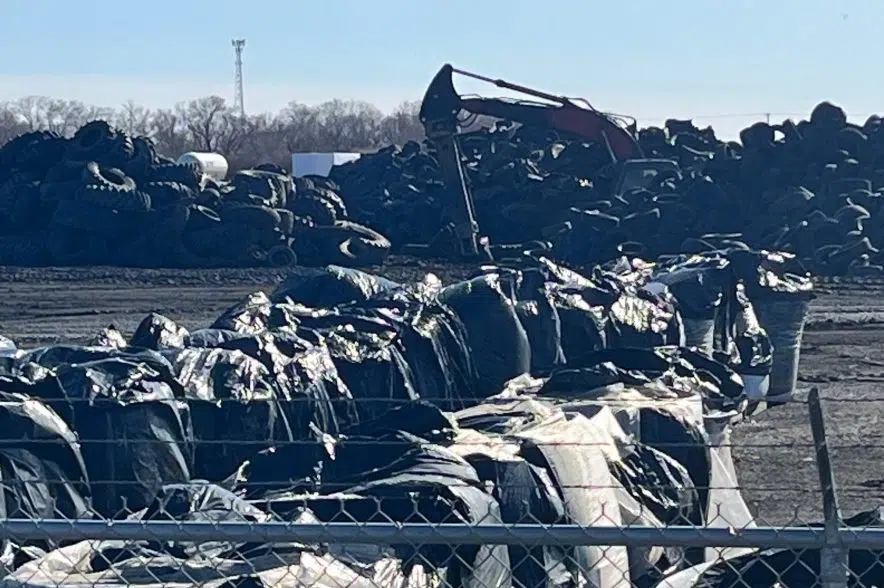Stevyn Arnt, CEO of Tire Stewardship of Saskatchewan, is fighting “tire with tire,” so to speak.
That’s after Shercom Industries – a long-time Saskatoon scrap tire recycler and manufacturer of value-added items like rubber tiles – and Tire Stewardship of Saskatchewan (TSS) couldn’t come to a long-term contract agreement. TSS is responsible for overseeing all tire recycling in Saskatchewan.
As of May 1, Shercom was no longer able to accept tires from around the province.
Shercom president Shane Olson said dozens of staff members have been laid off, including long-term employees.
Over the next few days, employees will work through the remaining piles in Shercom’s industrial yard, and then the recycling portion of the plant will be closed.
“Nobody wants to see a Saskatchewan success story go under because of bureaucracy. The hurt, first and foremost, is for our staff,” Olson said.
TSS CEO Stevyn Arnt said it’s unfortunate his organization and Shercom couldn’t work something out.
“We were unable to come to terms on a long-term agreement, or even on a short-term arrangement to allow us to do some more independent analysis on the current rate that they’re being paid,” said Arnt.
“I understand they’re very upset. No one likes to lose a monopoly.
“We’re trying to do the best thing that we can for the environment and, ultimately, for the end consumer in the province. We want to thank Shercom for their participation. They have been a valued partner for many years,” he said.
Arnt encouraged the company to bid for another contract in the future.
Olson said negotiations with TSS began back in 2020, and Shercom signed nine extensions to allow for meaningful negotiations. He said Shercom’s tipping fee was largely unchanged since 2012, even though the environmental fee for tires went up more than 40 per cent.
Saskatchewan, Olson said, has the highest operating costs and lowest profits for tire recycling of any province.
Olson said the offer from TSS amounted to a 30 per cent decrease, and he accused the non-profit of wooing Crumb Rubber Manufacturers (CRM) to Saskatchewan during that time. CRM, a California-based company, has now signed a contract with TSS, effectively replacing Shercom.
According to Olson, TSS has promised the U.S. company between 40 and 100 per cent of Saskatchewan’s scrap tires.
The plan, Arnt explained, is to have CRM operate as the province’s southern tire processor, and in the future a northern one as well in order to keep the environmental footprint smaller. That could happen sometime over the summer months, he said.
“We want to keep our costs down to ensure that we keep the environmental levy low in the province, but also to reduce our greenhouse gas emissions. We don’t want to be hauling tires unnecessary distances if there’s a closer alternative,” added Arnt.
In the meantime, until a Saskatoon-area tire recycler is found, up to 100 per cent of all scrap tires from the area will be sent to Moose Jaw.
Asked how that reduces the environmental footprint, Arnt said more value-added items will be created by CRM, and noted only about 20 per cent of the manufacturing done by Shercom is considered value-added processing.
“We’re trying to incentivize as much value-added processing as we can,” said Arnt.
“I believe that they are looking to do upwards of 100 per cent of their processing to be value-added.”
Arnt was asked whether the crumb – the product creating by shredding scrap tires – would remain in Saskatchewan or be sent to the U.S. for processing.
“They’re going to be focusing their sales efforts on Saskatchewan,” Arnt said.
“I know that their rubber-modified asphalt, I believe the Ministry of Highways is anxiously looking forward to learning more about. If they can sell 100 per cent in Saskatchewan, they will sell 100 per cent in Saskatchewan.”
Olson argued CRM’s products aren’t of the same quality as Shercom’s, and said the change is a loss for Saskatchewan.
“People should care because their dollars that they’re paying are going to an American company and will be leaving the province, along with the raw material,” said Olson.











